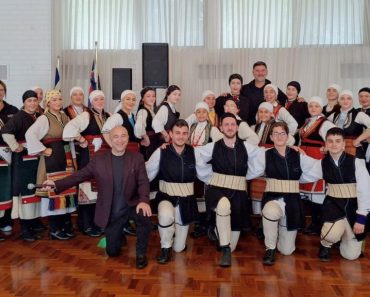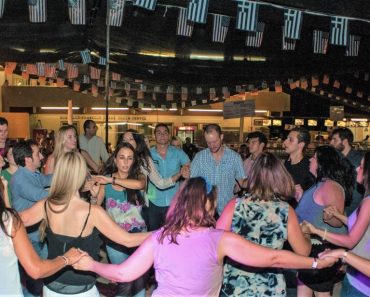
Dionysis Savvopoulos could fill out a stadium the size of OAKA but he shone best in more intimate settings where he could connect with his audience, sharing anecdotes and stories, performing crowd favorites and hearing his lyrics being sung back to him. [InTime News]
“Savvopoulos is a role I slowly crafted over the years: the guy with the round glasses and suspenders, later with a small beard, who appears on stage, makes up these songs, who comments and tells stories,” Dionysis Savvopoulos wrote in his autobiography, “Why The Years Fly By,” published (in Greek) in January by Patakis.
The much-loved singer-songwriter, known by the nickname “Nionios,” died at the age of 80 on Tuesday after being admitted to hospital last Friday. His death was announced by his family, and his funeral is due to take place – at public expense – on Saturday at Athens’ First Cemetery.
Dionysis Savvopoulos was born in Thessaloniki on December 2, 1944, and studied law at the city’s Aristotle University before dropping out to pursue a career in music. He left Thessaloniki for Athens in the early 1960s, making the journey in a truck, which inspired the title of his first album, “To Fortigo” (The Truck), released in 1966.
His work left a lasting mark not only on his fellow travelers in the 1960s but also on the generations that followed and sang his music. With his sharp wit, uproarious sense of humor, knack for satire and self-irony – melancholic, romantic, yet deeply poetic – Savvopoulos created his own distinctive musical idiom, blending rock with rebetiko, and art house with folk. He was bold and independent as an artist and a public figure, and he never hesitated to challenge popular sentiment.
‘The soles of my feet hurt when the wind blows from the south and it’s humid. It’s a legacy from Bouboulinas. I ache for that young man in Bouboulinas, but he was still able to write songs in his head in that dreadful gloom’
He was profoundly influenced by the great artists of his time, but also went on to influence an entire generation of artists at home, which earned him the reputation as a pioneer of Greek songwriting. On stage, he always had the energy – even when age took its toll – to rouse the crowd, set the rhythm and unite their voices with the wish: “May the dances never stop.”
Dionysis Savvopoulos was jailed twice during the 1967-1974 military dictatorship for his vocal opposition to the regime and often spoke of his experiences at the notorious Bouboulinas Street security police headquarters in downtown Athens, where thousands of dissidents were tortured.
“The soles of my feet hurt when the wind blows from the south and it’s humid. It’s a legacy from Bouboulinas. I ache for that young man in Bouboulinas, but he was still able to write songs in his head in that dreadful gloom,” Savvopoulos told Kathimerini in an interview in June 2024, pointing to the songs “Theia Manou” (Aunt Manou), “Thalassografia” (Seascape) and others that were eventually released in the album “To Perivoli you Trelou” (The Fool’s Garden) in 1969.
His first album, “The Truck,” is still regarded as a landmark in Greek music, while “The Fool’s Garden” established him as one of the most recognizable voices of that era. After the fall of the military regime and during the restoration of democracy, he continued to write songs that often expressed the zeitgeist and captured the contradictions of Greek society.

These include the songs “Rezerva” (Spare Tire) from 1979, “Trapezakia Exo” (Tables Outside) from 1983 and “Hathika” (I Got Lost) from 1987.
Another career landmark was teaming up with the great Sotiria Bellou for the legendary song “Zeibekiko,” while Savvopoulos was one of the first artists in Greece to experience being “canceled” by a portion of the public after the release of the album “Kourema” (Haircut) in 1989 and the scathing song “Koloellines” (Damn Greeks) more specifically, in which he challenged the image that himself had created.
He also hosted a show on state broadcaster ERT in 1986-1987, titled “Long Live Greek Song,” which, though short-lived, was considered groundbreaking and ushered in a new era for Greek television.

Dignitaries from across the political spectrum attended Dionysis Savvopoulos’ sold-out concert at Athens’ Odeon of Herodes Atticus, marking the 50th anniversary of the Metapolitefsi, as the period following the end of the 1967-1974 military dictatorship is known, in the summer of 2024. [InTime News]
In his own words
“Why the Years Fly By” is a comprehensive autobiography in which the artist seems to talk about everyone and everything. Below are a few extracts that perfectly capture his worldview and spirit.
On his parents: “We got on the plane with Aspa and the baby and flew to Thessaloniki to see my folks, whom I hadn’t seen in such a long time. They greeted us with such joy and ceremony. I felt a bit like a prodigal son who returns successful and comfortable, though. I understood my parents; I understood their fear.”
On his generation: “We were like James Dean in ‘Rebel Without a Cause’ – angry at the conservatism of Dad and Mom and anything that looked like them […] That’s why my generation – understandably – failed politically. Some ran off to India, others worshipped Mao, others were obsessed with [the battlecry in Eugène Pottier’s ‘The Internationale’] ‘Arise, the damned of the earth!’ […] but while we failed politically, the cultural product that arose from our thirst proved might. We’re still dining off it.”
On singing and songwriting: “So, if singing means singing a sacrifice, then what sacrifice am I singing when I sing? I once asked [Greek philosopher Stelios] Ramfos, who’s a wise man, and he answered: ‘The sacrifice you never made.’ He was right […] But if you sing about this wound, then it’s a bit like making that sacrifice you never made. The wound softens, life becomes lighter, and it carries on.”
On rap music: “The result is completely primitive, as if they came out of their caves, stood in front of the microphone, legs wide, and start spewing – their words. I understand a young person trying to create something of his own and constantly running up against obstacles. I was such a young man myself. But if we end up believing that ‘the world is a bucket of shit and nothing more,’ then what can we expect from it? Nothing at all.”

Dionysis Savvopoulos teamed up with a varied group of popular Greek singers, including Anna Visi, Despina Vandi, Michalis Hadzigiannis, Antonis Remos, Alkistis Protopsalti and others, for the Athens Olympic Games Closing Ceremony in the summer of 2004. [InTime News]







